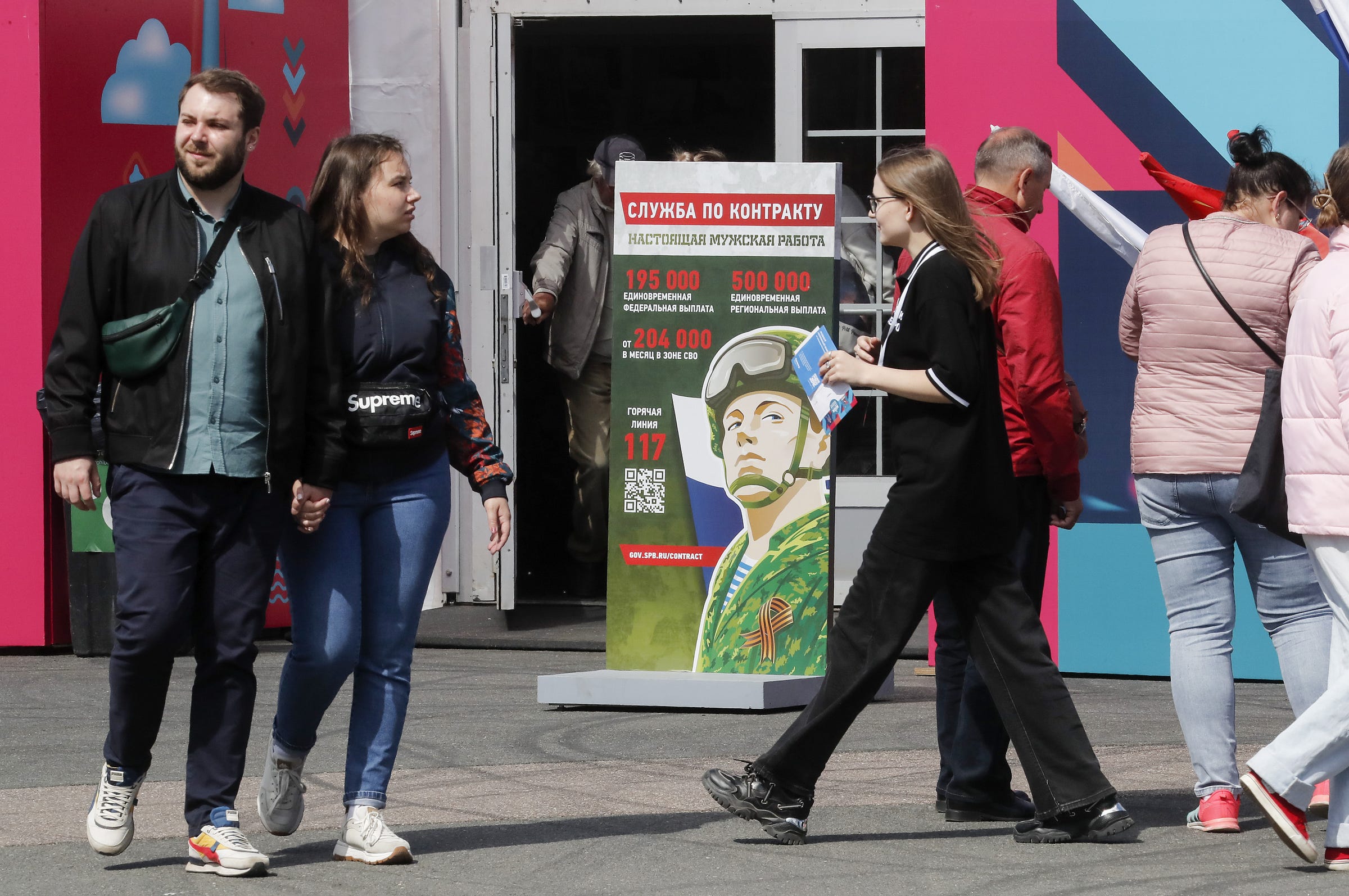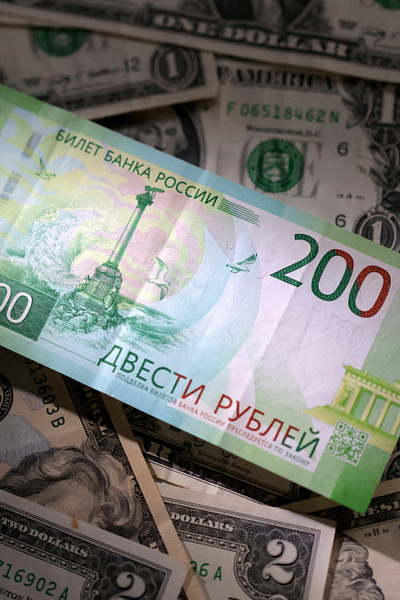So many jobs, so few skilled workers - how war and population decline are pushing Russia's economy to the brink
Falling population levels and a mass exodus of skilled workers since the invasion of Ukraine, have left Russia with a growing labour shortage and big question marks over long-term economic security.
By Victoria Safronova.
In a speech in Dagestan this week Vladimir Putin praised Russia’s ‘historically low unemployment levels'. But with current job vacancies now far exceeding the number of people able to fill them, Russian economists and employers are starting to worry about what this means for the economy in the longer term. Russia’s population has been in decline for decades, and the exodus of skilled workers since the invasion of Ukraine is now further exacerbating the problem, leaving many businesses and industrial enterprises facing serious challenges.
In a speech in Dagestan on 28 June Vladimir Putin painted an upbeat picture of the Russian economy. Hailing what he called the “positive dynamics"at play. He noted that Russia was experiencing not just low inflation levels, but also "a historically low level of unemployment".
Unemployment is indeed at unprecedentedly low levels in Russia right now. In March it was at 3.5%, and in April, it fell again to 3.3%. Both figures are a record for the country.
For Putin, and his government this is a sign that the Russian economy has successfully dealt with war and sanctions imposed by the West. And while the president has acknowledged in previous speeches that some businesses across the country are facing challenges from a shortage of skilled workers, overall the labour shortage means in the end that wages will rise.
Certainly, it is a good time in Russia to be a job seeker. With far more jobs offer than there are people to fill them, employers are willing to offer higher salaries and many management roles are vacant. The many Russian who left the country after the invasion of Ukraine, left behind opportunities for promotion for all those that stayed.
However this does not necessarily mean that this is cause for celebration. In the long term, these problems in the labour market will most likely negatively impact the Russian economy. Salaries are going up not because people are working harder, but because there simply aren’t enough workers. And many of Russia’s highly qualified specialists have left the country.
Why is Russia experiencing a labour shortage?
“The situation we find ourselves in sees low unemployment not as a result of a rapidly expanding economy, but because of a shrinking workforce” the economist Ruben Yenikolopov explains.
An ageing population has troubled Russia since long before the start of the war. The 1990s and early 2000s saw a low birth-rate, meaning that the generation now entering the labour market is substantially smaller in numbers than preceding generations.
“The number of young people entering the labour market has decreased by about 100 thousand every year since 2008,” explains Aleksei Zakharov, president of recruitment company ‘SuperJob’. “Then there were 1.5 million young people working, this year there are about 700 thousand”.
Other factors leading to the labour shortage are mobilisation, significant emigration and an inflexible Russian labour market. Employers are slow to offer pay rises or other incentives to job seekers. Furthermore, the education system in Russia makes it difficult to re-train workers.
At the start of Russia’s invasion of Ukraine, Russian employers did not know what to expect and so froze new hires. Job seekers started to show a more active interest in new vacancies and started renewing their CVs.
This trend continued until June 2022 and by May 2023 the number of active vacancies continued to grow, but the number of applicants fell.
“The shortage is absolutely felt across all sectors”, says Aleksei Zakharov of ‘SuperJob’. “We lack doctors, programmers, teachers, we can’t say that certain people are more in demand or less in demand”.

According to Oleg Buklemishev, director of economic policy studies at the economics faculty of the Moscow State University, it is hard to predict what the situation will look like in the near future.
“It’s a game with many factors and a lot of uncertainty,” he says. “How actively will mobilisation be pursued? Will there be a new wave? How will the government act? These are just a few of the questions that make it hard for researchers to make any predictions.”
The industrial sector
In April, the Egor Gaidar Institute of Economic Policy identified the most significant labour shortage in the industrial sector since 1996. A survey of industrial businesses found that over a third of them (35%) did not have enough workers.
For light industry, the outlook is increasingly uncertain. According to Sergei Tsukhlo, head of the Gaidar Institute's market research laboratory. Businesses are ‘practically shouting’ about the lack of secondary educational institutions and the failure to produce workers with the necessary qualifications.
“Since the start of the sanction war, the market has become remarkably free. The departure of expensive and mass brands presents an opportunity for Russian light industry products. However, there is simply no one to produce them,” says Tsukhlo.
Many economists feared mass unemployment at the start of the war following the departure of international businesses. However, as they left, many sold their assets, which then continued to operate under their new owners.
According to Aleksei Mironov, vice-president for Operations at the recruitment agency ‘Ankor’, labour shortages are an old problem for Russian industry.
“Industry is growing faster than the labour market”, he explains. “The education system is not preparing specialists in the numbers that they are needed. There just aren’t enough people with the right knowledge, experience, and competencies.“
There is a similar story in the industrial sector. Companies have told the BBC that mobilisation affected their ability to recruit highly educated and highly skilled specialists which are particularly hard to replace.
Many companies received letters demanding the details of their workers. In some cases, workers were called up straight from their place of work.
What has changed for those in upper and middle management?
For senior managers, the situation is mixed. The mass departure of Western companies has led to an influx of (their locally hired) managers into the labour market.
Consequently, managers are not always able to easily move to equivalent positions in Russian companies. Moreover, according to Aleksei Mironov, the experience of these managers does not always match the needs of Russian companies.
“People with experience of work in European companies are not always useful to companies from Southeast Asia, Turkey or the UAE, who are expanding their business in Russia. Those companies prefer senior managers with direct experience in Asian markets,” explains Mironov.
Mironov refers to this trend as ‘Sinicization’, referring to Chinese experience.
“Someone might have very interesting international experience, valuable in its own right, but they still won’t be particularly useful to a company from South Korea, China, or Japan,” he explains.

Similarly, Russian companies look for managers with experience running a business within the country. In other words, with a focus on the regional and not international market.
Ruben Yenikolopov notes that career prospects for middle managers have gotten better over the last year. A trend directly relating to the emigration of managers whose positions now need to be filled, not because of a growth in the economy.
According to Yenikolopov, employers can benefit from this situation, “To ensure the promotion of less-qualified colleagues doesn’t seem artificial, extra training must be provided”.
How will the labour shortage affect the economy?
This perfect storm of low unemployment and a rapid growth in wages is paradoxically both increasing and decreasing certain opportunities for Russia’s population at large.
The growth of wages is most clearly seen in the state administration and industrial sectors associated with the military-industrial complex (for example, optics, electronics, and the production of metal products).
According to Aleksandr Isakov, Head Economist at Russia Bloomberg Economics, this is far from the whole economy, but will help restore the economy after the crisis due to an increase in consumption.
The consequence for business is that companies may make less profit. As a result, companies will earn less as they spend more on staff, Isakov warns.
He believes the economy has a reserve of people under the age of 30. In March, unemployment for this demographic was at 11%.
Economists are now putting together their longer-term forecasts. In theory, a growth in salaries which is not matched by a growth in productivity is bad for an economy. In the long term such economies become less competitive as their products become more expensive to produce at home than in other countries.
A loss in economic competitiveness always indicates a lag in development away from other countries. Russia’s case is also being influenced by factors such as sanctions which inhibit the importance of products and technologies.
Even the growth of salaries and career possibilities seen in the labour market come with a catch.
“To look at the big picture for young educated people, who used to be involved in the world economy and could look to move to different countries down the line,” notes Ruben Yenikolopov.
“They now face a lower ceiling of what they can achieve in Russia. The economy is not growing as rapidly, so the ceiling is lower. Now they face a question: do they stay [at home] or do they go [abroad]?”
Read the full story in Russian here.
Translated by Danny Booth.
Edited by William Edelsten.
BBC is blocked in Russia. We’ve attached the story in Russian as a pdf file for readers there.





